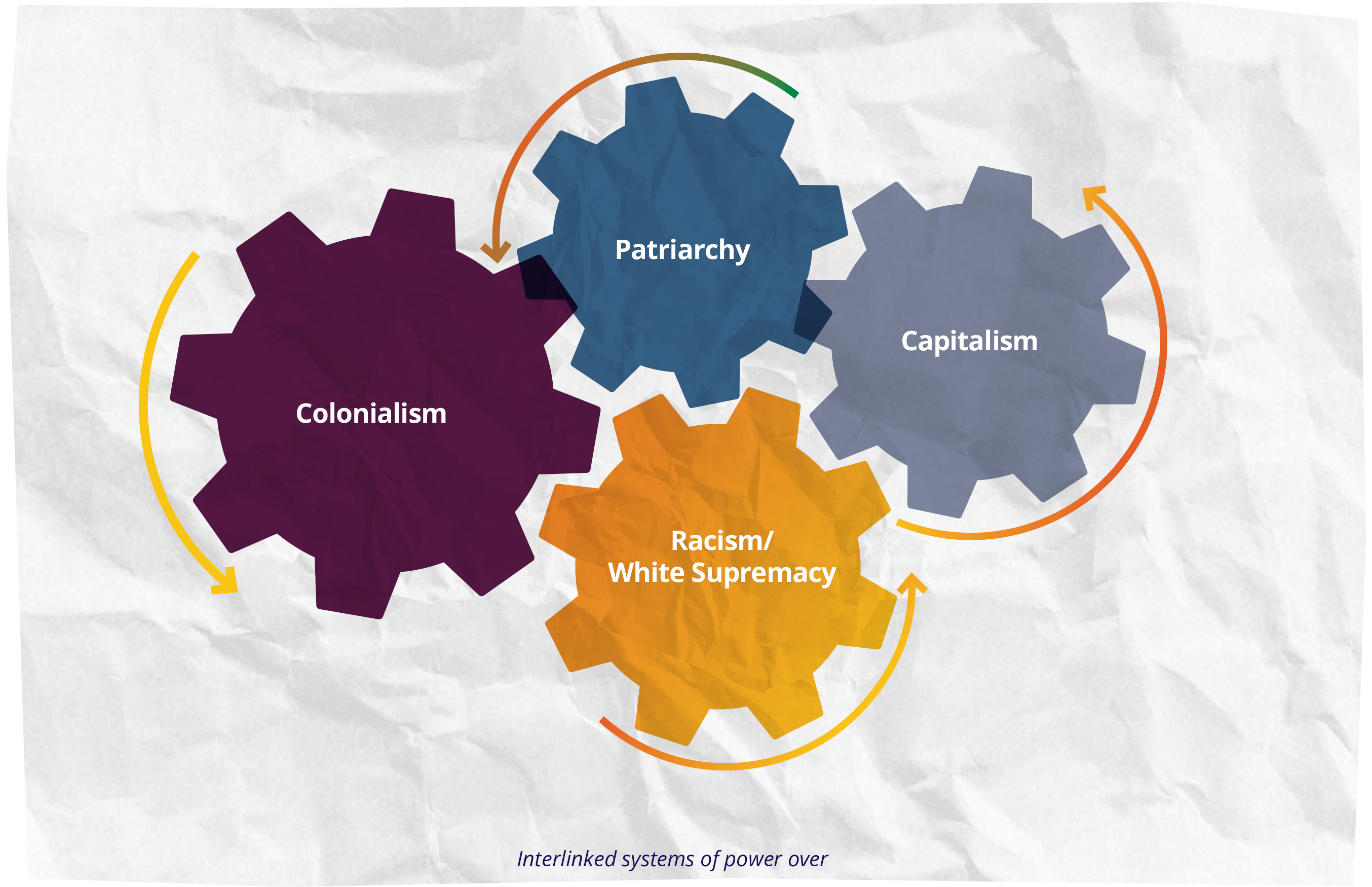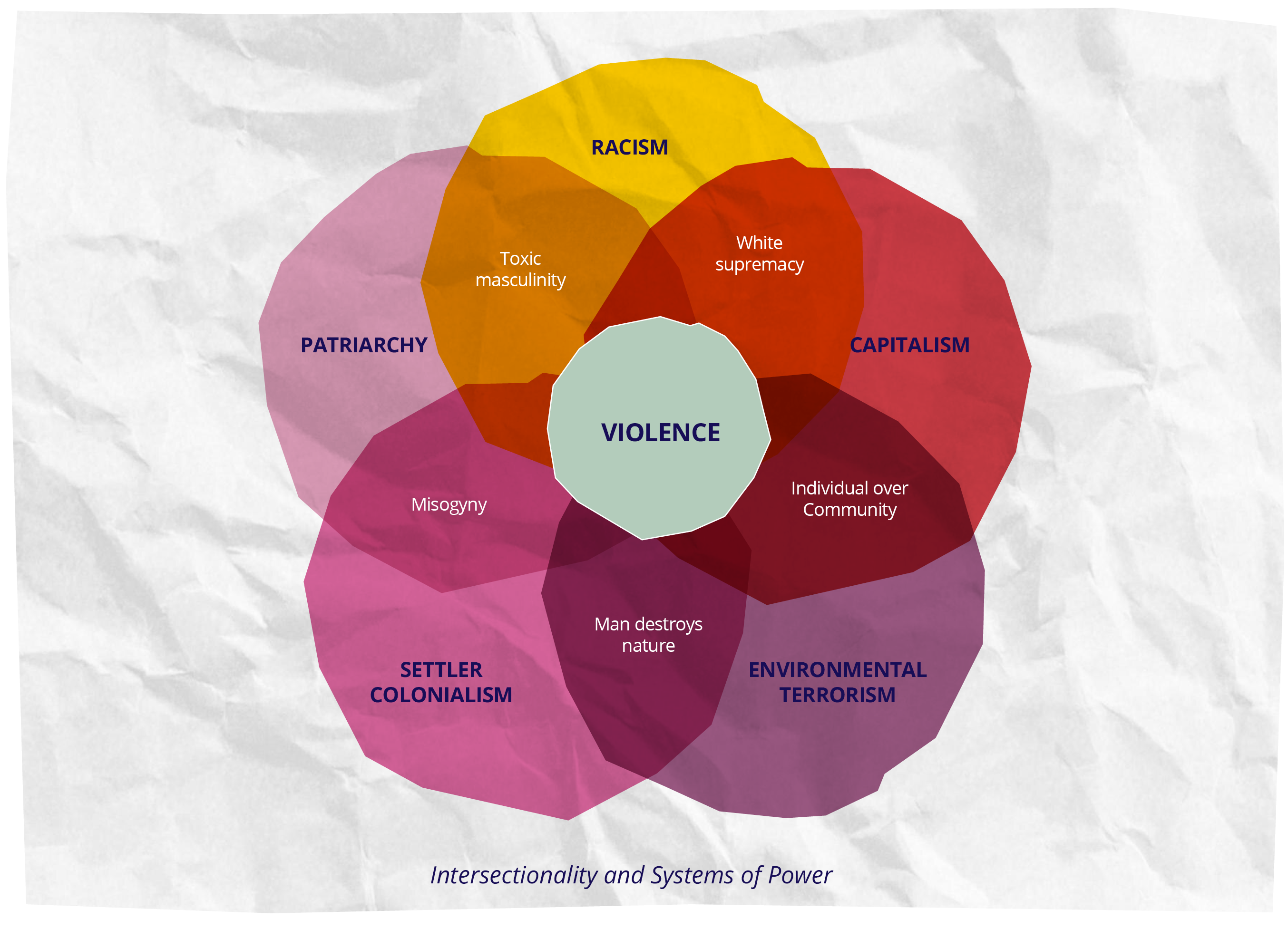Theme 3: Systemic Power

All economic, political, and social institutions and arrangements are shaped by underlying belief systems. Dominant systems include patriarchy, structural racism or white supremacy, colonialism-imperialism, and capitalism. The ‘logics’ of these systems set the ‘codes’ of dominant–subordinate, dehumanising, and extractive hierarchies among people and between people and nature. These systems show up and change throughout history in ways that perpetuate structural violence, cultural erasure and genocide, and the extraction of natural resources, human labour, and even knowledge. However, their distinct and connected logics are often completely invisible and normalized.
Systemic power is global, though it may differ from place to place, and it is always contested. Throughout history, crises and alternative ideologies and economic and political models have exposed the flaws of these interlinked systems and put forth alternative systems and structures, such as Revolutionary Catalonia created by anarchists and communists before the Spanish Civil War or the Zapatistas in southern Mexico. Think of ideologies such as feminisms, Marxism, liberation theology, co-operativism, regenerative farming, the commons, Black power, Pan-Africanism, and abolition. These alternative ideas and models have thrived and shifted through different periods of history as scholars, movements, and organisations practised and globalised them, seeking to challenge dominant logics and create new arrangements.
The timeline exercise shows that, even as we make incremental change, moments of crisis reveal the sheer destructiveness and fallacy of dominant systems and ignite new ideologies and fresh calls to action. To take on this arena – systemic power – requires visionary imagination, unifying ideologies, and alternative propositions for organising our economic, ecological, social, and political lives. We need to challenge and upend not only the institutions of power but also the systems that underpin them. Working to challenge and transform power across the other three arenas can also have a systemic impact.

Forms of systemic power
This fourth arena of power is dominated by interlinked systems of patriarchy, capitalism, structural racism, and colonialism–imperialism. Historically, these systems have cemented a logic of domination, exploitation, and superiority that permeate our institutional structures and ways of thinking. These systemic ‘genetic codes’9 work to:
- Define who and what matters.
- Rationalise the commodification of labour and nature.
- Dehumanise and subordinate those deemed to have less value – often in relationship to their gender, race, ethnicity, class, sexuality, etc.
- Normalise violence and the threat of violence as ways to enforce order.
These oppressive systems of power are consistently contested by other systemic models and ideas.
Capitalism: the commodification and extraction of resources for profit and accumulation:
- Includes the exploitation of labour, natural resources, genetic material, public goods, and personal data.
- Assigns value to different kinds of labour and ‘work’, with reproductive and care work assigned zero or little value.
- Morphs and evolves over the centuries to include new arrangements, rules and modes of exploitation, and logics to justify them.
Patriarchy: the hierarchy that ‘naturalises’ the dominance and superiority of men and masculinity as leaders, decisionmakers, providers, and fighters, and women and femininity as weaker, less capable, less intelligent, and primarily useful for reproduction:
- Is based on a rigid biological binary between male and female.
- Defines ‘the family’ as heterosexual only.
- Rejects gender non-confirming and trans people as threatening and abnormal.
- Judges LGBTQI+ people as inferior or dangerous.
- Establishes biological hierarchies such as ableism and ageism.
Structural racism/white supremacy: the hierarchy that attributes less value, humanity, and rational capacity to people based on their caste, ethnicity, skin colour, culture, and nationality:
- Is structural, institutionalised, and reproduced through both unconscious and actively promoted beliefs and narratives in media and popular culture.
- Is maintained through violence, the threat of violence, and systematic exclusion from resources, opportunities, and decision-making.
Colonialism–Imperialism: a geographic, racialised code of inequality:
- ‘Justifies’ and institutionalises the exploitation and extraction of people and resources from some countries or peoples.
- Is based on race and ethnicity, painting some societies and cultures as ‘primitive’, exotic, or less ‘civilised’.
- Creates paternalistic relationships, reinforced by religion and other beliefs.
Examples of the ‘logics’ that justify and sustain systemic power abound.
- Attacks on women’s reproductive rights and access to abortion are framed as the defence of motherhood and family.
- Loan forgiveness for corporations is presented as essential for a healthy economy, while poor and working people and the Global South are forced into ‘austerity.’
- Extractive industries are framed as ‘development’ even as they destroy local land, water, forests and ways of life, and drive climate change.
A new political energy is driving efforts to reject these logics and the devastation they cause. To respond to systemic power, we must cultivate radical imagination, unifying ideologies, and alternative social, economic, and political models – feminism, the commons, regenerative economics, abolition, and liberation – to re-define our future.
Download handout: Forms of systemic power.

Activity 5: Unpacking and upending systemic power
How does systemic power operate and show up in our context? What bold ideas can we use to expose their logic? How can we shape and amplify alternative ways of being and models?
Materials: Cards or sticky notes (four colours), markers, handout: Forms of systemic power.
Before the activity, create a blank matrix on the wall or share copies.
Download Analysing the four arenas of power to copy and share.
Step 1: Our contexts
Plenary: Introduce the activity with a brief overview of systemic power. To reach a basic, shared understanding of the logics, nature, and interconnectedness of the dominant systems of power, review and discuss the definitions in the handout.
Small groups: Break into four groups, each taking one of the dominant forms of systemic power: patriarchy, structural racism/white supremacy, capitalism, or colonialism–imperialism. Discuss these questions, noting key examples on stickies.
- How does this form of systemic power show up concretely in our context and lives? Identify specific examples of how it is reinforced by visible, hidden, and invisible power.
- How has this changed over time? For example, how did colonialism present itself in earlier eras, and how does it present itself today? How has systemic power morphed over time?
Note that it can be easy to confuse contemporary trends and systemic power. Trends such as rising authoritarianism or white nationalism are indeed global and do influence power dynamics. However, these trends are shorter-term political projects, financed and organised by key actors to gain political and economic power. They are the product of these larger systems and tap into the logic, beliefs, and structures of patriarchy, capitalism, and white supremacy.
Plenary: Each group in turn posts their cards in the matrix on the wall. After each group presents, pause to discuss the questions.
- How does each system show up in our context in relation to each arena of power?
- How and where do these systems overlap and reinforce each other?
- How does systemic power make change more difficult?
- What are some of the ways these deeper systemic logics are contested? What alternative ideas, ideologies, and alternative economic and political models have emerged over time?
- What ideas or systemic power do we expose or tap into in our change strategies?
Step 2: Our issues
Plenary: Identify one issue or problem that everyone knows in their lives or faces in their activism. Examples could be extractive ‘development’ that threatens land, water, and environmental defenders, or gender-based violence. Form four groups, each tackling a different system: patriarchy, capitalism, structural racism/white supremacy, or colonialism–imperialism.
Small groups: Read the handout Forms of systemic power. Discuss how the system (for example, patriarchy) impacts your issue. Write two or three specific examples for each element listed below, using a separate card for each example:
- What are the key elements or structures of this system? (systemic power – green)
- What norms, values, and beliefs underlie the system? (invisible power – orange)
- How are powerful interests and agendas mobilised? (hidden power – grey)
- How are rules and decisions set and enforced? (visible power – blue)
Plenary: When all groups have shared their cards, invite everyone to look across each of the arenas of power (visible, hidden, invisible, systemic).
- How do capitalism and patriarchy reinforce each other? How do colonialism and white supremacy reinforce each other?
- How do these systems interact with and influence visible, hidden, and invisible power?
- How do we expose and challenge these systems? Give examples from your work. Can we create alternatives through the ways we organise and live?
- How does this analysis sharpen our strategies? How might we think differently about building and mobilising power through alliances?
- What systems – social, political, economic, ecological – do we imagine, aspire to, and centre in our agendas, organising, lives, and activism?
Further discussion:
How does the logic of capitalism prevent people from considering certain economic, environmental, or climate policy solutions? How do patriarchy and structural racism shape beliefs and politics in society particularly in relation to LGBTQI+ rights, marriage, migration, and employment? How does this overarching system shape our economic, political, and social lives and aspirations? What are the key features of each system’s ‘genetic codes’ with regard to power? For example:
One of the codes of patriarchy is to define ‘family’ as a man, a woman, and children, and treat all non-conforming behaviour as a threat.
A capitalist code treats nature as merely an exploitable resource and source of profit.
Download this activity
Download the worksheet: Analysing the four arenas of power.
____________________________
8 Canadian author, speaker, and award-winning bisexual/queer activist.
9 Grassroots Global Justice use this phrase to describe systemic logic in their International Feminist Organizing Schools, 2021, www.ggjalliance.org
